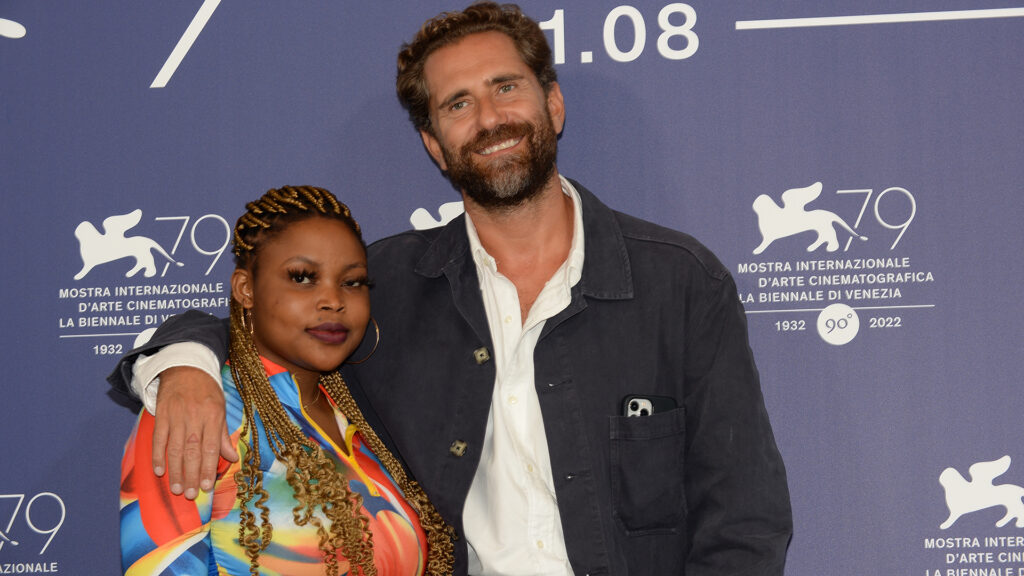
Princess is Italian director Roberto De Paolis’ second feature film. Its subject is the thorny subject of the trafficking of Nigerian women into Italy. The film opens the Orizzonti section today.
Princess is your second film. Why did you pick such a loaded topic as prostitution and illegal immigration?
It all began with the idea of making a film that will privilege the point of view of an immigrant woman, which has rarely been done before in Italy. Basically, I wanted to know what kind of experience would it be to get a new perspective on our own country, the perspective of a victim of trafficking, using film, which I believe employs a more specific, personal, even intimate language compared to journalism stories. I wanted to find a character and give her a voice and a face, as well as a story. This was my first idea. I also wanted to see if Italian crew could tell the stories of these Nigerian women by blending different points of view, steering clear of ideology, and make a movie on their own experience. The theme of prostitution came later. I have always thought of it as a world of its own, crazy, absurd, extreme… a perfect metaphor for many human conditions: two people share the utmost physical intimacy without ever knowing their real names. It brings us all to a carnal, instinctual level. And yet, it’s about money and power, too.
Prostitutes go on stage every day. They play a part for their clients – by the way, in the film you’ll see real clients as well as actors – and this continuously changing characters represent, for a director, a very interesting world, a world of archetypes, of mythological characters reviewed in modern fashion.
There’s a scene in the film where the protagonist is having intercourse with a customer – she is totally removed from it, in fact, she is checking out her Instagram on her phone. Many women told me that it’s normal to check your phone while with a customer – they are not there physically or emotionally. Paradoxically, the customers do not feel this lack of contact as a problem. Maybe it’s what they’re after, or they would be pursuing more stable relationships. They, instead, use prostitution to look for total independence, a sort of assisted loneliness.
How did you choose Glory Kevin as your protagonist, and how hard was it to develop the necessary empathy with her and coach her through her first acting job?
The protagonist is not a professional actress. In fact, only three of them are. Glory Kevin was born in Nigeria in 1996, and among all women we interviewed, she was the boldest and bravest in giving her all for this experience and become the one voice for all these young women. She is the one who convinced the other and make them understand that this film does not denounce them, rather, it shows their experience. Once they understood this idea, they were eager to work together, albeit the difference backgrounds, cultures, and even ages. It hasn’t been easy, but I am proud of a film that has not been made about them, it has been made with them. They have been free to represent themselves, and truthfully, I am not sure they would have liked the idea of having yet another group of Italians telling them what to do. We listened and accepted their input on the story. They have been part of the creative process

Princess is a young Nigerian woman and an undocumented immigrant to Italy. She works the streets. Like a legendary Amazon, she travels to a sort of enchanted forest, a large pinewood extending as far as the sea and a place of solace, as well as sustenance. It is there that she...
Your film is a story, but it is also an essay on a controversial topic as immigration. Don’t you run the risk of speaking to the already informed? How to solve this paradox?
It is complicated, and the answer is as well. I think that the mere fact that we were able to make this film is a good thing, with such a story and such an inclusive work method. We convinced Rai Cinema and the government to fund us, and Indigo and Lucky Red to distribute our work. Cinema, and art in general, cannot seem to be able to influence culture much at this time, but that doesn’t mean we should stop believing in its power. When films are distributed in theatres and in festivals, our audience is unexpectedly diverse. Cinema can offer an intimate language, and watching a two-hour film showing the point of view of a Nigerian woman can certainly raise awareness and undermine prejudice. The intimacy offered by film is the driving element we built upon.
Being a filmmaker in Italy today – how healthy is our cinema?
Presently, our cinema is in very good health. What we lack is in audience. Over the last ten to fifteen years, many filmmakers started great careers in independent or auteur cinema. Many directors who today are between the ages of 35 and 55 made quite an impression in the industry. In parallel, those films lost some of their audience along the way. We are all working so hard, now, much more than ever before, for different kinds of distribution platforms and different kinds of cinema. It’s all evolving, though, and we should be able to weather this change.
No results found.